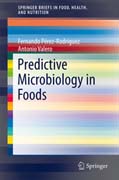
Predictive microbiology is a recent area within food microbiology, which studies the responses of microorganisms in foods to environmental factors (e.g., temperature, pH) through mathematical functions. These functions enable scientists to predict the behavior of pathogens and spoilage microorganisms under different combinations of factors. The main goal of predictive models in food science is to assure both food safety and food quality. Predictive models in foods have developed significantly in the last 20 years due to the emergence of powerful computational resources and sophisticated statistical packages. This book presents the concepts, models, most significant advances, and future trends in predictive microbiology. It will discuss the history and basic concepts of predictive microbiology. The most frequently used models will be explained, and the most significant software and databases (e.g., Combase, Sym’Previus) will be reviewed. Quantitative Risk Assessment, which uses predictive modeling to account for the transmission of foodborne pathogens across the food chain, will also be covered. ?
- ISBN: 978-1-4614-5519-6
- Editorial: Springer
- Encuadernacion: Rústica
- Páginas: 128
- Fecha Publicación: 01/01/2013
- Nº Volúmenes: 1
- Idioma:
